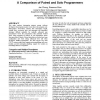Free Online Productivity Tools
i2Speak
i2Symbol
i2OCR
iTex2Img
iWeb2Print
iWeb2Shot
i2Type
iPdf2Split
iPdf2Merge
i2Bopomofo
i2Arabic
i2Style
i2Image
i2PDF
iLatex2Rtf
Sci2ools
103
click to vote
CSCW
2006
ACM
2006
ACM
Interruptions on software teams: a comparison of paired and solo programmers
This study explores interruption patterns among software developers who program in pairs versus those who program solo. Ethnographic observations indicate that interruption length, content, type, occurrence time, and interrupter and interruptee strategies differed markedly for radically collocated pair programmers versus the programmers who primarily worked alone. After presenting an analysis of 242 interruptions drawn from more than 40 hours of observation data, we discuss how team configuration and work setting influenced how and when developers handled interruptions. We then suggest ways that CSCW systems might better support pair programming and, more broadly, provide interruption-handling support for workers in knowledge-intensive occupations. Categories and Subject Descriptors H5.3 [Information Interfaces and Presentation]: Group and Organization Interfaces – Collaborative Computing. General Terms Management; Human Factors Keywords Pair programming, collaborative work, ethnogr...
CSCW 2006 | Developers Handled Interruptions | Pair Programming | Social Sciences | Study Explores Interruption |
| Added | 13 Jun 2010 |
| Updated | 13 Jun 2010 |
| Type | Conference |
| Year | 2006 |
| Where | CSCW |
| Authors | Jan Chong, Rosanne Siino |
Comments (0)

